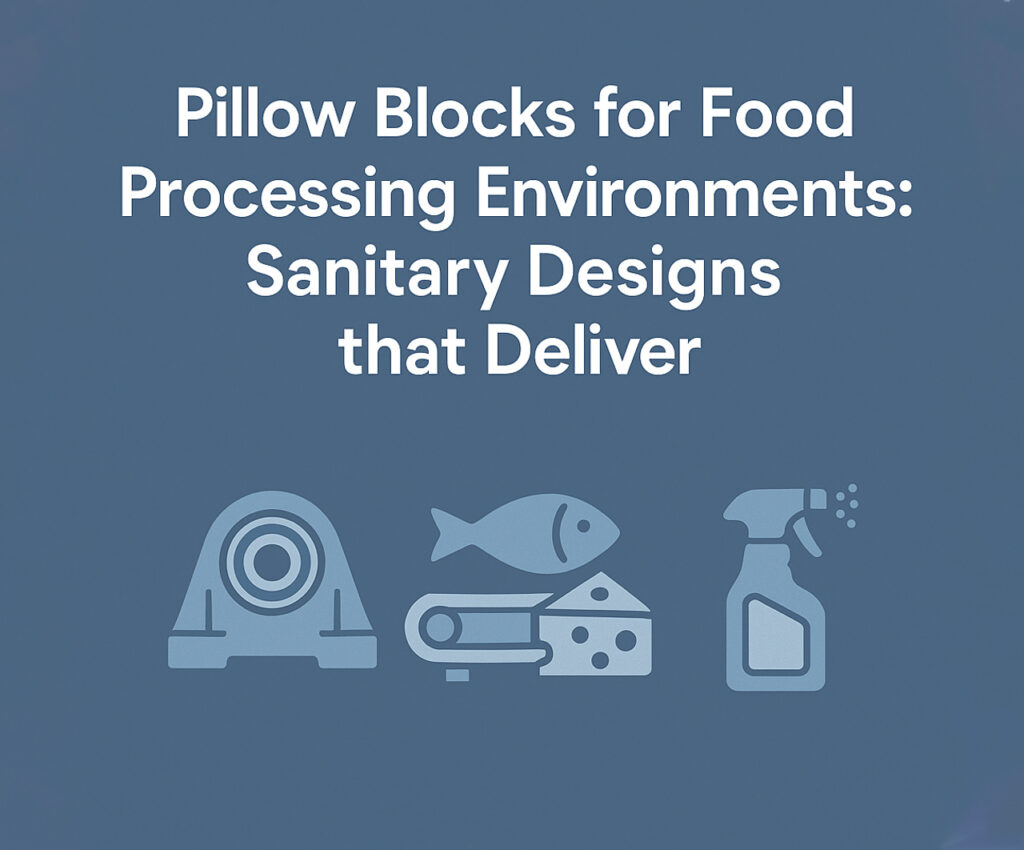In the world of food processing, hygiene is everything. From conveyor lines to packaging machinery, every component must meet strict cleanliness and safety standards. Among the unsung heroes of these systems are pillow blocks—essential bearing housings that support rotating shafts. Whether you’re working with a 1 pillow block in a compact mixer, a 2 1 2 pillow block bearing in a slicing machine, or a 3 4 pillow block in a secondary packaging system, choosing a sanitary design is critical to avoiding contamination, improving washdown resistance, and boosting operational uptime. Know More
What Is a Pillow Block Bearing?
A pillow block is a pedestal that houses a bearing, supporting a rotating shaft and allowing smooth movement. It’s bolted to a foundation or frame and used in a wide variety of applications—from agriculture to pharmaceuticals. In the food industry, however, pillow blocks must not only handle dynamic loads and motion but also withstand aggressive cleaning, humidity, and regulatory scrutiny.
A standard 1 pillow block may suffice in a dry environment, but in food processing, it needs to be reimagined with hygiene as the primary goal.
Why Sanitary Design Matters in Pillow Blocks
Food safety regulations like those from the FDA and USDA demand machinery components that prevent contamination. Pillow blocks can become breeding grounds for bacteria if not designed with sanitary features. This makes the traditional open designs unsuitable.
Sanitary pillow blocks must feature:
- Corrosion-resistant materials (stainless steel, polymer, or ceramic coatings)
- Smooth, crevice-free surfaces
- Sealed bearings to protect against ingress
- Drainage channels to avoid water pooling
Whether you’re using a 2 1 2 pillow block bearing on a heavy-duty conveyor or a 3 4 pillow block on a packaging line, design enhancements make all the difference in food-grade environments.
Key Features of Sanitary Pillow Blocks
1. Stainless Steel Housings
Stainless steel resists corrosion from food acids, cleaning chemicals, and moisture. Unlike cast iron, it doesn’t rust or pit. The most commonly used grades are 304 and 316, with 316 offering superior resistance in highly acidic or salty conditions.
2. Polymer Housings
For lightweight or budget-sensitive systems, high-performance polymers such as PBT or UHMW-PE are used. These resist chemical attack and reduce metal contamination risk.
3. FDA-Approved Seals and Lubricants
Seals made from nitrile rubber, silicone, or Viton ensure that contaminants cannot enter the bearing cavity. Paired with food-grade lubricants, they maintain safety and performance.
4. Sloped Surfaces for Drainage
Water pooling creates a haven for bacteria. Sanitary pillow blocks feature sloped and rounded surfaces to enable complete drainage during washdowns.
Whether you specify a 1 pillow block in a portable mixing unit or a 2 1 2 pillow block bearing in a fixed inline machine, these features are must-haves.
Comparing Standard vs. Sanitary Pillow Blocks
| Feature | Standard Pillow Block | Sanitary Pillow Block |
| Housing Material | Cast Iron | Stainless Steel / Polymer |
| Surface Finish | Painted / Rough Cast | Polished / Smooth |
| Sealing | Open or basic seal | Triple-lip, FDA-approved |
| Drainage | None | Sloped for washdown |
| Lubrication | Industrial grease | NSF H1 food-grade grease |
| Bacterial Resistance | Low | High |
When deciding between a conventional 3 4 pillow block and its sanitary counterpart, the long-term cost and compliance benefits of sanitary designs often outweigh the initial price difference.
Common Applications in Food Processing
- Meat and Poultry Plants: Constant exposure to water and protein residues demands stainless pillow blocks with triple seals.
- Dairy Facilities: High humidity and acidic cleaning agents necessitate corrosion-proof housings and bearings.
- Bakeries: Heat and flour dust require polymer-coated or hybrid bearings.
- Frozen Foods: Low-temperature performance and moisture resistance are crucial.
A 2 1 2 pillow block bearing might be used on large conveyors, while a compact 1 pillow block may be ideal for tight spaces on prep tables.
Selecting the Right Size and Material
Size Matters:
- 1 Pillow Block: Best for small machinery, mixers, and auxiliary equipment
- 3 4 Pillow Block: Often used in mid-size prep tables or ingredient dispensers
- 2 1 2 Pillow Block Bearing: Suited for mainline conveyors and cutting machinery
Material Choice:
- 316 Stainless Steel: Harsh cleaning, acidic foods
- Polymer: Lightweight machines, dry processing
- Hybrid (Stainless + Plastic Insert): Balanced performance
Matching the size and material to your specific application is key for hygiene and reliability.
Maintenance Tips for Sanitary Pillow Blocks
- Regular Inspection: Check seals and surfaces after washdowns.
- Use Food-Grade Grease: Always verify NSF H1 certification.
- Avoid Over-Lubrication: Excess grease attracts particles.
- Replace Worn Seals Promptly: Damaged seals can cause contamination.
- Schedule Downtime for Cleaning: Allow full drainage and drying post-cleaning.
These practices apply whether you’re maintaining a 3 4 pillow block on a slicing machine or a 2 1 2 pillow block bearing in a blender.
Innovations in Sanitary Pillow Block Design
Self-Lubricating Bearings
Some modern pillow blocks now include bearings with internal lubrication reservoirs or solid lubricants, eliminating the need for re-lubrication.
IP69K Certification
This rating ensures the unit can withstand high-pressure, high-temperature washdowns. IP69K pillow blocks are becoming standard in USDA-certified plants.
Color-Coded Housings
Color options help distinguish zones (e.g., allergen vs. non-allergen), making inspection easier.
These upgrades can be found even in compact sizes like 1 pillow block units, providing top-tier hygiene across the production line.
Regulatory Compliance and Standards
To ensure food safety, pillow blocks should meet:
- FDA Requirements: Materials must be non-toxic and food-safe.
- NSF/ANSI Standards: Verifies use of hygienic lubricants and materials.
- 3-A Sanitary Standards: Specific to dairy and beverage equipment.
- HACCP Guidelines: Bearings should support critical control point monitoring.
Purchasing a sanitary 2 1 2 pillow block bearing from certified manufacturers ensures these requirements are met.
Cost vs. Risk: Why Sanitary Designs Are Worth It
While sanitary pillow blocks may cost more initially, the ROI is evident in:
- Reduced Contamination Risk: Avoid recalls and shutdowns.
- Less Downtime: Easier to clean and maintain.
- Extended Equipment Life: Resistant to corrosion and damage.
- Audit Readiness: Confidence during inspections.
For example, a 3 4 pillow block in a humid slicing chamber, if not sealed and sanitary, could be the weak link that invites mold or bacteria growth.
Tips for Buying Sanitary Pillow Blocks
- Confirm Seal Integrity: Triple-lip or labyrinth seals offer the best protection.
- Demand Material Certification: Ensure all components are FDA-compliant.
- Inspect Surface Finish: Look for smooth, polished exteriors.
- Check Operating Temp Ranges: Especially important in baking and chilling zones.
- Work with Trusted Suppliers: Buy from vendors who specialize in food-grade bearings.
Whether you’re sourcing a 1 pillow block for an artisan mixer or a 2 1 2 pillow block bearing for industrial meat processing, quality should never be compromised.
Final Thoughts: Elevating Hygiene Through Smart Bearing Choices
In food processing, the smallest detail can make the biggest difference. Pillow blocks, though often overlooked, play a vital role in ensuring safe, reliable operations. Choosing sanitary designs for your 1 pillow block, 2 1 2 pillow block bearing, or 3 4 pillow block setup means aligning your equipment with the highest standards of cleanliness, durability, and efficiency.
Modern sanitary pillow blocks go beyond basic bearing support—they actively contribute to food safety, regulatory compliance, and operational excellence. In an industry where trust is everything, investing in the right components is not just smart—it’s essential.

